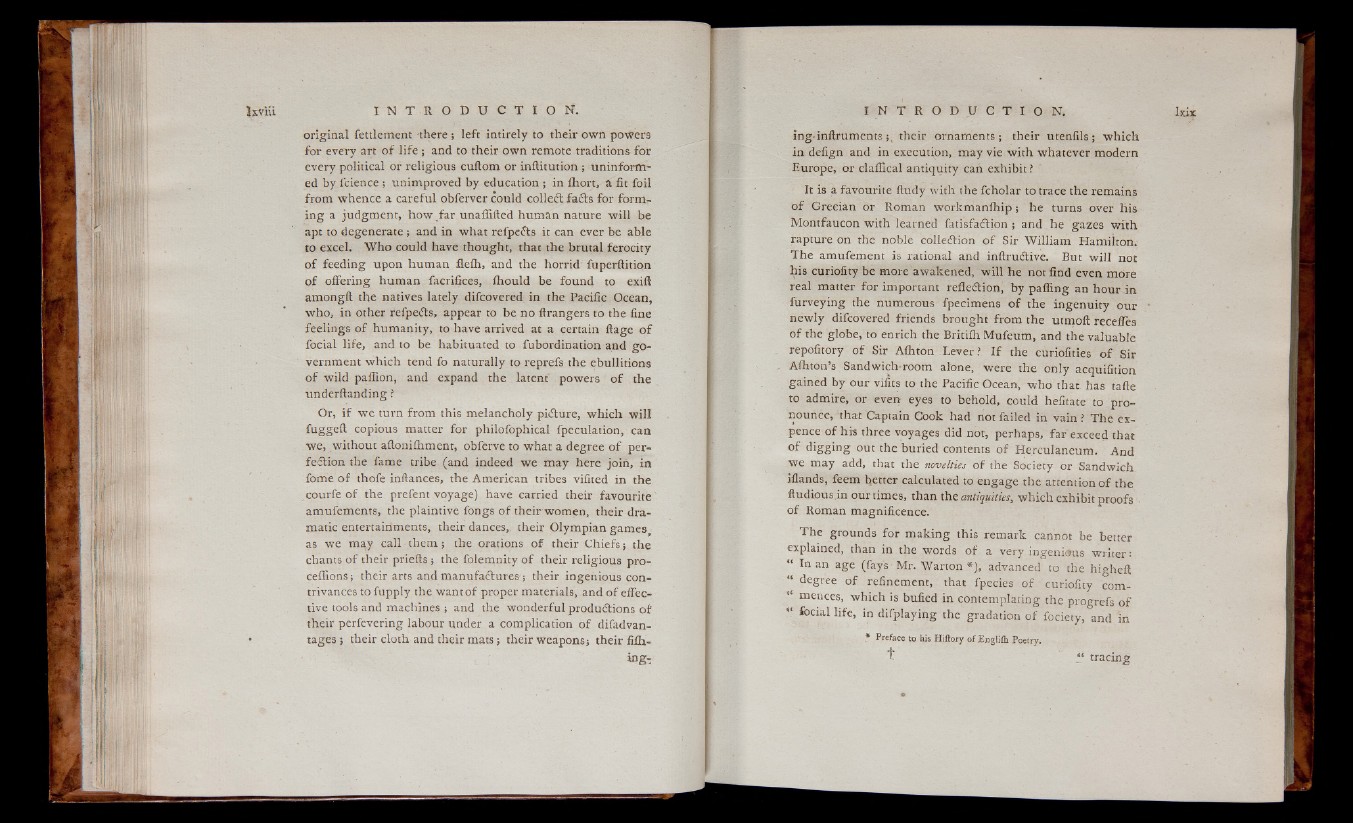
original feulement there ; left intirely to their own powers
for every art of life ; and to their own remote traditions for
every political or religious cuftom or inftitution ; uninformed
by fcience ; unimproved by education ; in ihort, a fit foil
from whence a careful obferver could colleft facts for forming
a judgment, how far unaffifted human nature will be
apt to degenerate ; and in what refpeils it can ever be able
to excel. Who could have thought, that the brutal ferocity
o f feeding upon human fleih, and the horrid fuperftition
of offering human facrifices, fhould be found to exift
amongft the natives lately difcovered in the Pacific Ocean,
who, in other refpetRs, appear to be no ftrangers to the fine
feelings of humanity, to have arrived at a certain ftage of
focial life, and to be habituated to fubordination and government
which tend fo naturally to reprefs the ebullitions
of wild paillon, and expand the latent powers of the
underftanding ?
Or, if we turn from this melancholy pidture, which will
fuggeft copious matter for philofophical fpeculation, can
we, without aftoniihment, obfërve to what a degree of perfection
the fame tribe (and indeed we may here join, in
fome of thofe inftances, the American tribes vifited in the
courfe of the prefent voyage) have carried their favourite
amufements, the plaintive fongs of their women, their dramatic
entertainments, their dances,, their Olympian games,
as we may call them ; the orations of their Chiefs ; the
chants of their priefts ; the folemnity of their religious procédions;
their arts and manufactures'; their ingenious contrivances
to fupply the wantof proper materials, and of effective
tools and machines ; and the wonderful productions of
their perfevering labour under a complication of difadvan-
tages ; their cloth and their mats ; their weapons; their fifhi
5 g i
ing-inflruments their ornaments ; their utenfils ; which
in defign and in execution, may vie with whatever modern
Europe, or claflical antiquity can exhibit?
It is a favourite ftudy with the fcholar to trace the remains
of Grecian or Roman workmanfhip; he turns over his
Montfaucon with learned fatisfaCtion ; and he gazes with
rapture on the noble collection of Sir William Hamilton.
The amufement is rational and inftruCtive. But will not
his curiofity be more awakened, will he not find even more
real matter for important reflection, by palling an hour in
furveying the numerous fpecimens of the ingenuity our
newly difcovered friends brought from the utmoft recedes
of the globe, to enrich the Britifh Mufeum, and the valuable
repofitory of Sir Afhton Lever! I f the curiofities of Sir
Afhton’s Sandwich-room alone, were the only acquifition
gained by our vifits to the Pacific Ocean, who that has tafte
to admire, or even eyes to behold, could hefitate to pronounce,
that Captain Cook had not failed in vain ? The expence
of his three voyages did not, perhaps, far exceed that
of digging out the buried contents of Herculaneum. And
we may add, that the novelties of the Society or Sandwich
iflands, feem fetter calculated to engage the attention of the
ftudious in our times, than the antiquities^ which exhibit proofs
of Roman magnificence.
The grounds for making this remark cannot be better
explained, than in the words of a very ingenious writer:
“ In an age (fays Mr. Warton *), advanced to the higheft
“ degree of refinement, that fpecies of curiofity commences,
which is bulled in contemplating the progrefs of
“ focial life, in difplaying the gradation of fociety, and in
* Preface to his Hiftory o f Engliih Poetry.
* , “ tracing